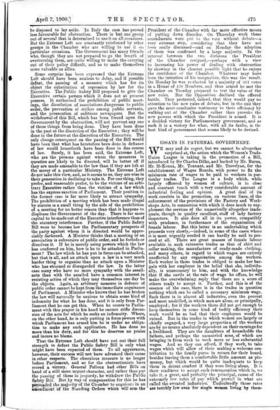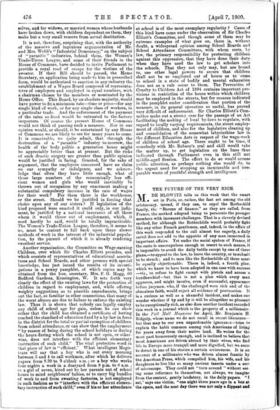ESSAYS IN PATERNAL GOVERNMENT.
WE may and do regret, but we cannot be altogether surprised at, the action which the Women's Trade- Union League is taking in the promotion of a Bill, introduced by Sir Charles Dilke, and backed by Mr. Burns, Mr. McKenna, Mr. Tennant, and Mr. Trevelyan, for the establishment of Wages Boards, with power to fix the minimum rate of wages to be paid to workers in par- ticular trades. The League is a body which, while largely officered by women of culture, is in close and constant touch with a very considerable amount of industrial feeling and opinion. A great deal of its work consists in the promotion, on various lines, of the enforcement of the provisions of the Factory and Work- shops Acts, in connection with which it does much to sup- plement the services of the numerically altogether inade- quate, though in quality excellent, staff of lady factory inspectors. It also does all in its power, compatibly with prudence, in furtherance of the organisation of female labour. But this latter is an undertaking which proceeds very slowly,—indeed, in some of the cases where it is most urgently needed it can hardly be said to pro- ceed at all. There are great masses of female labour available iu such extensive trades as that of shirt and collar making, the manufacture of ready-made clothing, and many others, in regard to which wages are entirely unaffected by any organisation among the workers. Each worker in these trades is obliged to make her bar- gain with her employer in the belief that she, individu- ally, is unnecessary to him, and with the knowledge that if she cavils at the rate of wage he offers, he will make the overwhelming reply that there are a score of others ready to accept it. Further, and this is of the essence of the case, there is in the trades in question nothing which can be called a necessary minimum wage. Such there is in almost all industries, even the poorest and most unskilled, in which men are alone, or principally, employed ; for if the workers there did not get enough to keep themselves in some kind of bodily efficiency their work would be so bad that their employers would be ruined. But in the trades in which women are largely or chiefly engaged, a very large proportio n of the workers are by no means absolutely dependent on their earnings for a livelihood. They are the daughters of households the fathers, and perhaps the unmarried sons, of which are bringing in from week to week more or less substantial wages. And so they can afford, if they work, to take wages which will allow of their making a welcome con- tribution to the family purse in return for their board, besides leaving them a comfortable little amount as pin- money, but which would be quite inadequate to keep them in decent comfort if they were living alone. It is their readiness to accept such remuneration which is, we take it, a great, and probably the principal, cause of the extremely low rates of pay which prevail in what are called the sweated industries. Undoubtedly those rates are tembly low even for single women living by them- selves, and for widows, or married women whose husbands have broken down, with children dependent on them, they make but a very small remove from actual destitution.
It is not, therefore, surprising that, with the authority of the massive and ingenious argumentation of Mr. and Mrs. Webb's " Industrial Democracy," on the subject of " parasitic " industries, behind them, the Women's Trade-Union League, and some of their friends in the House of Commons, have decided to invite Parliament to provide a royal road of escape for the victims of the sweater. If their Bill should be passed, the Home Secretary, on application being made to him in prescribed form, would be authorised to sanction in any industry the establishment of a Wages Board composed of representa- tives of employers and employed in equal numbers, with a chairman chosen by the members or nominated by the Home Office. This Board, by an absolute majority, would have power to fix a minimum rate—time or piece—for any single kind of work, or for any single class of workers, in a particular trade. And the enforcement of the payment of the rates so fixed would be entrusted to the factory inspectors. Of course the present House of Commons would not think of passing such a measure. Nor in our opinion would, or should, it be entertained by any House of Commons we are likely to see for many years to come. It is conceivable, we quite admit, that through the destruction of a " parasitic " industry to-morrow, the health of the body politic a generation hence might be appreciably better than at present. But this risks of such drastic surgery are greater than public opinion would be justified in facing. Granted, for the sake of argument, that the employers concerned have no claim on our sympathy or indulgence, and we acknow- ledge that often they have little enough, what of those large numbers of the economically less effi- cient women and girls who would inevitably be thrown out of occupation by any enactment making a substantial compulsory increase in the rate of wages for their work ? For them there is the workhouse, or the street. Should we be justified in forcing that choice upon any of our sisters ? If legislation of the kind proposed were enacted it could only, in our judg- ment, be justified by a national insurance of all those whom it would throw out of employment, which, it need hardly be said, would be totally impracticable. The Women's Trade-Union League, therefore, it seems to us, must be content to fall back upon those slower methods of work in the interest of the industrial popula- tion, by the pursuit of which it is already rendering excellent service.
Another organisation, the Committee on Wage-earning Children, over which Sir Charles Elliott presides, and which consists of representatives of educational associa- tions and School Boards, and other persons with special knowledge, has just issued the results of its investi- gations in a penny pamphlet, of which copies may be obtained from the hon. secretary, Mrs. F. G. Hogg, 60 Bedford Gardens, Kensington, W. It sets forth very clearly the effect of the existing laws for the protection of children in regard to employment, and, while offering weighty suggestions as to possible amendments, brings out the fact, so familiar in other connections, that many of the worst abuses are due to failure to enforce the existing law. Thus it is shown that nobody can legally employ any child of school age for gain, unless he can show either that the child has obtained a certificate of having reached the standard of education fixed by a by-law in force in the district for the total or partial exemption of children from school attendance, or can show that the employment "by reason of being during the school holidays or during the hours during which the school is not open, or other- wise, does not interfere with the efficient elementary instruction of such child." The vital protective word in that piece of law is " efficient." What intelligent Magis- trate will say that a boy who is out every morning between 3 and 4 to call workmen, after which he delivers papers from 5.30 to 9 o'clock a.m.; or a boy who works tour nights a week in a dustvard from 9 p.m. to 6 a.m. ; or a girl of seven, hired out by her parents out of school hours to mind neighbours' babies, or to carry big bundles of work to and from sweating factories, is not employed in such fashion as to "interfere with the efficient elemen- tary instruction of such child," even if his or her attendance at school is of the most exemplary regularity ? Cases of this kind have come under the observation of Sir Charles Elliott's Committee, and though some of them may be extreme examples of what goes on, there is, without doubt, a widespread opinion among School Boards and School Attendance Committees, with whom rests, 1,v law, the primary responsibility for protecting children against this oppression, that they have done their duty when they have used the law to get scholars into the schools. That they not only may, but are bound to, use other legal powers to secure that children shall not be so employed out of hours as to ' come to school in a state of bodily and mental exhaustion does not as a rule occur to them. The Prevention of Cruelty to Children Act of 1894 contains important pro- visions in restriction of the hours within which children may be employed in the streets, but for reasons indicated in the pamphlet under consideration that portion of the measure, in its general operation so useful, has proved very difficult of enforcement. Sir Charles Elliott's Com- mittee make out a strong case for the passage of an Act facilitating the making of local by-laws to regulate, with regard to locally varying requirements, the street employ- ment of children, and also for the legislative clearing up and consolidation of the somewhat labyrinthine law in the different Education Acts in respect of the wage.work of children of school age. There ought to be time, if somebody with Mr. Robson's zeal and skill would take the matter up, to get legislation on the lines thus indicated through Parliament even in this still not middle-aged Session. The effort to do so would arouse public attention, as perhaps nothing else would: do, to the urgent need for stopping an inexcusable and irre- parable waste of youthful strength and intelligence.







































 Previous page
Previous page